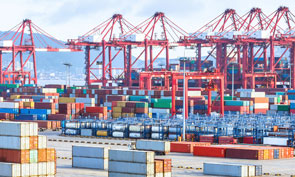
The cost of delays to your shipments could add up to a great deal more than damage to your relationship with customers. In 2015 the Federal Maritime Commission estimated that average fees for demurrage and detention at key US ports could exceed $200 per day. A single day of detention could increase the cost of a shipment by as much as 11%*. Two recent events have thrown the cost of delays into sharp relief. Port congestion at San Pedro Bay in the US and a strike in two NSW ports in Australia have led to delays that have incurred charges which have had shippers complaining bitterly.
Demurrage is in essence a rent for the period the container overstays its allotted time in the terminal, while detention is the charge for extended use of the container. Recently, some shipping lines have toughened up on the point at which they charge these fees and there is evidence that shippers view them as a means of generating revenue. Maersk’s 2018 financial results itemize a revenue figure of around $1bn** from demurrage and detention receipts – a significant element in a total annual turnover of $28.4bn. With rising capacity and softening spot rates predicted for the coming year, coupled with higher fuel costs resulting from new IMO rules, it is a trend that can only be expected to continue.
The practice is widely known and understood. The International Federation of Freight Forwarders Associations recognizes that maritime carriers have legitimate interests in charging container detention fees. They recently stated that such fees are “an important tool for shipping lines to ensure the efficient use of their container stock which represents a substantial investment. For shipping lines, it is essential to turn around their containers as fast as possible, consequently merchants who use containers for longer periods should be discouraged from this practice.” This didn’t prevent one irate Australian from venting his frustration during the NSW strike saying: “Shipping lines don’t play nice and give extra time. Shipping lines don’t care. They don’t give a rat’s arse about the trucking operator”
While strikes and port-side congestion are not things you can control, there are common causes of delay that you can predict and avoid. Inadequate or non-compliant cargo securing picked up during increased routine cargo inspections is a frequent cause of delay. And it is one that will stop your cargo in its tracks until the load is reconfigured and repacked. But it is one you can avoid by working with a cargo protection partner who can ensure that your cargo is safely protected wherever they are in the world.
Cordstrap’s cargo protection solutions have been developed in conjunction with all the world’s major regulatory bodies. They are fully CTU Code compliant and are certified and approved by DNV, the IMO, Mariterm AB and the Association of American Railroads. We can support every part of your global supply chain with training and advice from our network of experts in over 50 countries worldwide. Our solutions have been designed to be faster and less labor-intensive to apply: this is why we can reduce transit times still further, driving down the total cost of ownership. Talk to our experts about protecting your cargo: get in touch without delay.
Sources:
* https://www.icontainers.com/help/demurrage-detention-per-diem-shipping-delay-charges/
** https://theloadstar.com/fury-at-carrier-demurrage-and-detention-fees-profiting-from-port-congestion/
For expert advice on cargo securing solutions contact us now
Contact now